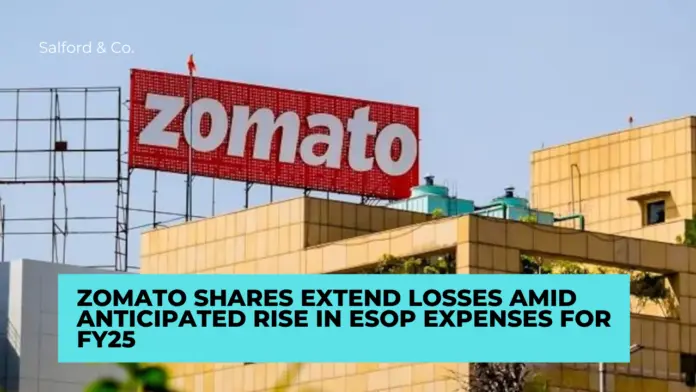Zomato’s stock has faced continued losses as investors react to projections of increased employee stock ownership plan (ESOP) expenses for the fiscal year 2025 (FY25). The company’s stock performance reflects concerns about potential impacts on profitability and shareholder value.
Overview of Zomato’s Stock Performance
Recent Losses
Zomato’s stock has experienced a downward trend in recent trading sessions, with losses attributed to concerns over projected increases in ESOP expenses. This decline follows a period of volatility in the broader market and highlights investor apprehensions regarding the company’s future financial performance.
Reasons for Projected ESOP Expense Increase
The projected increase in ESOP expenses for FY25 is driven by various factors, including Zomato’s efforts to attract and retain talent through equity-based compensation. Additionally, the company’s expansion plans and growth prospects may necessitate additional stock-based incentives for employees.
Impact on Zomato’s Stock
Investor Sentiment
Investor sentiment towards Zomato’s stock has been affected by the projected ESOP expense increase, as it raises concerns about the company’s ability to manage costs and maintain profitability in the long term. Uncertainty surrounding future earnings and cash flow has contributed to a cautious outlook among investors.
Market Reaction
The market has reacted negatively to news of the projected ESOP expense increase, leading to a decline in Zomato’s stock price. Investors are closely monitoring developments and assessing the potential implications of higher expenses on the company’s financial health and competitive position.
Analysis of ESOP Expense Increase
Implications for Zomato
The projected increase in ESOP expenses poses several implications for Zomato, including potential dilution of existing shareholders’ equity and impact on earnings per share. Additionally, higher expenses could strain the company’s cash flow and limit its ability to invest in growth initiatives.
Potential Challenges
Zomato may face challenges in managing ESOP expenses effectively while balancing the need to incentivize employees and maintain financial discipline. The company will need to implement robust cost management strategies and communicate transparently with investors to mitigate concerns and rebuild confidence.
Quick Review:
Q1.What is the main reason behind Zomato’s stock decline amid the projected ESOP expense increase for FY25?
Ans. Zomato’s stock decline is primarily attributed to concerns among investors regarding the potential impact of projected ESOP expense increases on the company’s profitability and shareholder value.
Q2.How are investors reacting to the news of the projected ESOP expense increase for Zomato?
Ans. Investors are reacting negatively to the news, as reflected in the continued decline of Zomato’s stock. There are concerns about the company’s ability to manage costs effectively and maintain financial stability amidst higher expenses.
Q3.What implications does the projected ESOP expense increase have for Zomato’s financial health and competitive position?
Ans. The projected increase in ESOP expenses could potentially dilute existing shareholders’ equity and impact earnings per share. It may also strain the company’s cash flow and limit its ability to invest in growth initiatives, posing challenges to its competitive position in the market.

